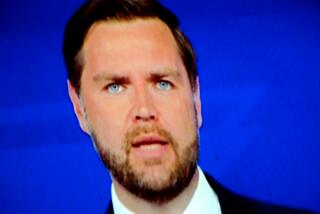It’s Bush’s Turn
- Share via
The Republican National Convention opening today in New Orleans is both a hazard and an opportunity for Vice President George Bush, as was the Democratic meeting last month in Atlanta for Massachusetts Gov. Michael S. Dukakis.
The threat to Dukakis was greater in that he had the delicate task of handling the forces of Jesse Jackson and then had to define himself, as the political commentators put it, to the voting public in his acceptance speech. Dukakis dealt with the Jackson matter adroitly and delivered a solid acceptance address. He went into the convention seeming gubernatorial and emerged seeming presidential, enjoying a major boost in opinion polls.
Bush’s task in maintaining a united convention is not as daunting. There is no major incipient revolt in the ranks. But he may have more difficulty emerging from the convention as fully presidential, for, even as the nominee, Bush still will be working to some extent in the shadow of Ronald Reagan. And the more he attempts to distinguish himself from the most conservative aspects of the Reagan presidency--on child care and civil rights, for instance--the more Bush risks offending the core of Reagan ideologues on the right.
Considerable attention has been devoted to the two party platforms this year. This is in part because the Democrats adopted a broad statement of vague principles in contrast to the detailed pledges of the past that were designed to appease various party constituencies and wound up scaring everyone else. And now the Republicans are pumping considerable detail into their platform, trying to appear more precise and confident of where they want to go.
But the platform story probably is being over-done in terms of factors that will influence Americans to vote the way they will on Nov. 8. The parties’ records in the White House and Congress over the past eight years are more graphic and telling than either platform can be. And considerable numbers of voters are likely to make decisions on the basis of what they hear from the two nominees in the forthcoming debate or debates.
There always is lots of party talk at convention time, but the fall campaign basically is a head-to-head contest between the two nominees. No one is certain just why voters wind up voting the way they do, but much of the motivation is bound to be visceral. Is the candidate honest? Can he be trusted? How will he hold up under the pressures of the office? How well does he relate to the average voter? Is he likable?
Bush goes into the Republican National Convention looking vice presidential. Whether he is to emerge looking presidential is largely up to him.
More to Read
Get the L.A. Times Politics newsletter
Deeply reported insights into legislation, politics and policy from Sacramento, Washington and beyond. In your inbox twice per week.
You may occasionally receive promotional content from the Los Angeles Times.










